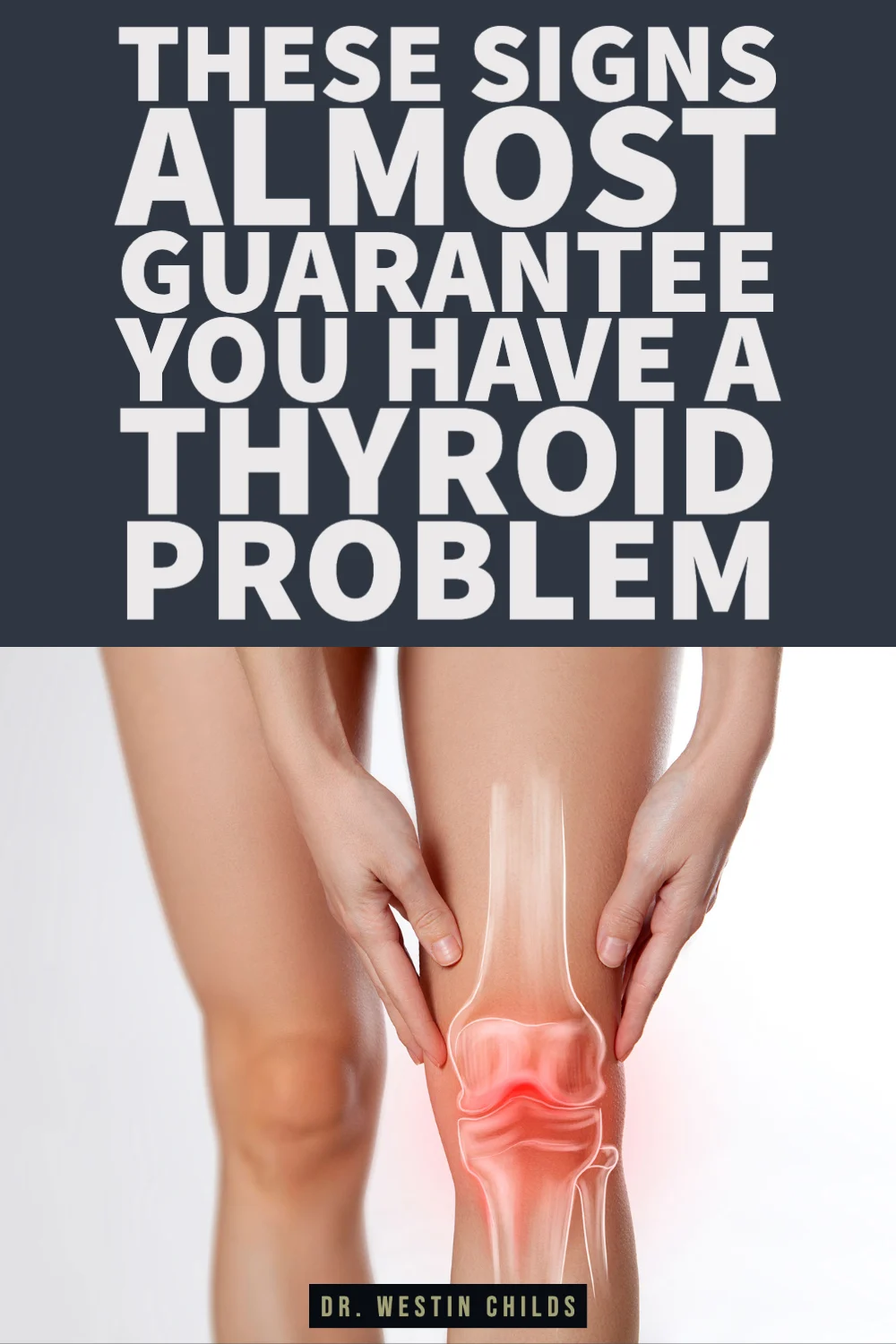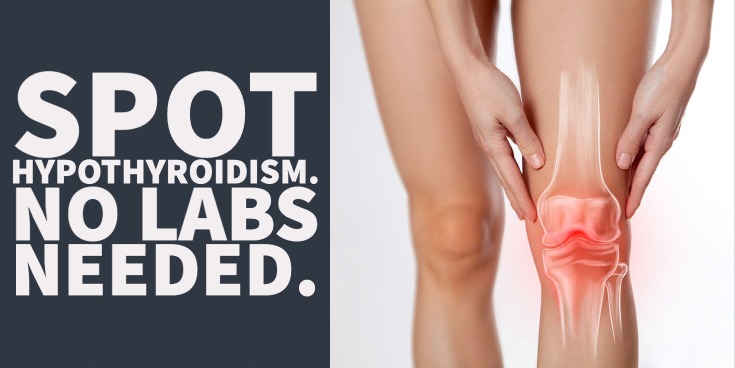10% to 20% of the population have this hormone imbalance and it’s called hypothyroidism.
Hypothyroidism, what is it?
It’s a state of low thyroid function and it’s almost always caused by an autoimmune disease.
This autoimmune disease is known as Hashimoto’s Thyroiditis.
Your thyroid controls and regulates just about every single system in your body.
When your thyroid is low your entire body will slow down.
That includes heart rate, energy production, brain function, metabolism, gut function, and more.
Small changes in thyroid function can result in big symptoms that you will feel on a daily basis.
You might think this isn’t a problem because your doctor will be able to test for it.
You’d hope so but that’s not the case.
Unfortunately, most doctors are focused on other hormone imbalances like diabetes which means low thyroid patients get left in the dust.
In addition, most doctors are focused on ordering the wrong tests which means you are likely to be told that you’re normal when you really aren’t.
That’s the bad news.
The good news is that you can often tell if you have this hormone imbalance just by looking at your symptoms.
Let’s start with the first and biggest symptom:
DOWNLOAD FREE RESOURCES
Foods to Avoid if you Have Thyroid Problems:
I’ve found that these 10 foods cause the most problems for thyroid patients. Learn which foods you should avoid if you have thyroid disease of any type.
The Complete List of Thyroid Lab tests:
The list includes optimal ranges, normal ranges, and the complete list of tests you need to diagnose and manage thyroid disease correctly!
#1. Weight gain.
The first sign that your thyroid is out of whack is often unexplained weight gain.
If you’ve been eating a ton of unhealthy food and not exercising, that’s not unexplained.
If that’s the case then you have a perfectly good reason to gain weight and the solution is to fix your lifestyle.
But what if you haven’t made any changes to your lifestyle and yet you continue to see the scale creeping up and up?
That’s a major problem and an indication that something is off in your body, most likely your thyroid.
When the thyroid starts to slow down, you can expect to gain about 10-15 pounds of unexplained weight gain (1) over a few months.
This weight gain will occur without any changes on your part making it incredibly frustrating.
If this 10-15 pounds is directly related to your thyroid then it will most likely be evenly distributed across your entire body.
But you should always be aware that low thyroid states can cause abnormal weight gain patterns as well.
Sometimes abnormal weight gain in the arms, legs, thighs, and gut, may also be related to your thyroid.
Why does your thyroid lead to weight gain?
For one very important reason:
Your thyroid controls and regulates your metabolism.
When thyroid function drops, your metabolism will drop in lockstep meaning you will be burning fewer calories each and every day.
While your weight is an important measure, it’s not the only thing that gets disrupted when you have a thyroid problem.
#2. Next, Look at The Health of Your Hair, Skin, and Nails.
You can tell a lot about the health of a person by looking here.
Problems in the hair, skin, and nails, are often the first sign that something is off on the inside of the body.
This is because they are considered non-essential for survival.
When problems arise, the body will preferentially shunt resources (including nutrients and vitamins) to more vital organs like the heart, liver, and kidneys in place of the hair, skin, and nails.
This means looking at your skin can give you clues about your overall health including the health of your thyroid.
And when it comes to thyroid health, one of the best places to look is your eyebrows.
If you are experiencing eyebrow hair loss on the lateral one-third of your eyebrow, it’s almost guaranteed that you have a thyroid problem.
Here’s why:
There are so few things that cause eyebrow hair loss in this specific region that if you are experiencing this symptom, it’s very likely that your thyroid is involved.
If the term ‘lateral one-third of your eyebrow’ is confusing to you, let me explain:
Imagine breaking up the entire length of your eyebrow into thirds.
The first third is closest to the bridge of your nose, the second third is right above your eye, and the third third is closer to your temple.
If you notice that the first and second thirds of your eyebrows are intact but you are losing hair on the third of your eyebrow that is closest to your temple, you have this special type of eyebrow hair loss.

But beyond your eyebrows, you can also look at the health of your hair more generally as well.
Hypothyroidism causes widespread hair loss across the entire head.
This type of hair loss is known as telogen effluvium.
If you notice that your hair is coming out in big chunks when you take a shower or when you comb it, you may be experiencing this type of hair loss.
Telogen effluvium occurs when your hair is unable to transition from the resting phase to the growing phase.
And this is a common sign of hypothyroidism.
Lastly, you can also take a look at the overall health of your skin as a way to assess your general thyroid health.
When your thyroid is low, you will experience dry and cracked skin (2) all over your body.
More than dry skin, you might also start to notice that you aren’t sweating as much or that the texture and quality of your skin have changed.
While looking at your hair, skin, and nails is helpful, this next symptom might be even more useful.
#3. Cold Hands and Feet.
If you wear socks to bed, especially in the summer, you probably have a thyroid problem.
I call this the positive sock sign.
The same goes for you if you are someone who is always wearing extra layers or sweaters during the summer.
When thyroid function drops, it slows down your body’s ability to generate heat.
As a result, you end up with cold hands and cold feet.
But perhaps more importantly, you also end up with an intolerance to that cold feeling or sensation.
If getting cold makes you angry, uncomfortable, or irritable, that’s what I’m talking about by intolerance.
This symptom is called cold intolerance (3) and, just like eyebrow hair loss, it’s very specific to the thyroid.
Next, you can also look at an obvious place which is…
#4. Your Neck
Anatomically speaking, your thyroid rests right at the base of your neck right above your collar bones.
This is both good and bad.
Good because it means you can sometimes identify if there is swelling or a bump in your thyroid gland.
And bad because of its location in your neck, it can cause all sorts of problems for nearby structures.
Sometimes, though not always, patients with hypothyroidism experience swelling of their thyroid gland.
Swelling and inflammation most often occur with inflammatory thyroid conditions like Hashimoto’s thyroiditis.
An enlargement of the thyroid gland can also occur with hypothyroidism caused by certain nutrient deficiencies like iodine deficiency as well.
When this happens, the enlargement of the thyroid gland is called a goiter.
If your thyroid gland enlarges to a big enough size, it may start to put pressure on your vocal cords which may result in a change in your voice.
For this reason, low thyroid states can lead to hoarseness (4).
If you’re a singer or someone that uses their voice for their job, this can be a big problem and maybe something you notice right away.
For others, it may not be as big a deal.
But what is a big deal is what your thyroid does to your brain which leads us to…
#5. Mood Changes and Brain Fog.
Remember when I said that when your thyroid slows down it slows everything down?
This includes your brain function and cognition!
Patients with hypothyroidism notice that their brain is just more sluggish than normal.
They aren’t able to recall words or phrases like they once could.
They can’t think clearly for long periods of time and they even have trouble concentrating.
When it’s related to your thyroid it’s not ADD or ADHD, it’s hypothyroidism.
Not only will your thyroid impact your brain function, but it can also impact your mood.
There is a clear connection between depression and anxiety and those with hypothyroidism (5).
If you feel like you’re not quite yourself, or maybe someone else has noticed that you are acting differently, it may be your thyroid.
#6. Muscle Aches and Pains.
This one is a little different from the others, so let me explain.
When your thyroid is low, your muscles lose their ability to relax.
When this happens, you’ll end up with painful trigger points that you can identify by simply poking around on your muscles.
If you find an exquisitely tender spot, it’s probably a trigger point.
The presence of trigger points doesn’t automatically mean you have a thyroid problem, but if you notice a lot of these trigger points and you also have the other symptoms I’ve already discussed, then there’s a pretty good chance the two are related.
In addition to the presence of trigger points, you might also start to experience full-blown muscle and joint pain as well.
These symptoms can be particularly troublesome and may lead you to diagnoses such as fibromyalgia or chronic pain syndromes when the reality is they are related to your thyroid.
Finally, the last place you will want to look is at your gut:
#7. Constipation
The easiest way to tell if your gut is healthy is to take a look at your bowel movements.
You don’t have to physically look at them, but you should be aware of how often they come.
If you aren’t having at least one bowel movement a day that comes easily and without strain, you have a problem.
Some doctors may try to convince you that having a bowel movement once every 4 days is normal but I can assure you that it is not.
Based on normal physiologic transit times, your bowels should empty at least once every 24 hours.
If they don’t, this means you have some sort of issue in the gut which is interfering with this transit time.
And one of those issues may be your thyroid.
Your thyroid helps to control the rhythmic motion of your gut known as peristalsis (6).
When thyroid function declines (as in the case of hypothyroidism), your entire gut slows down.
This sets the stage for the development of constipation and gut problems like small intestinal bacterial overgrowth and small intestinal fungal overgrowth syndromes.
Your Next Steps
As you might have already guessed, it’s kind of hard to say someone has thyroid problems simply by looking at their symptoms alone.
And no doctor will provide you with a diagnosis of hypothyroidism without confirmatory lab tests given how easy they are to obtain.
Having said that, understanding these symptoms is still incredibly helpful and important to thyroid patients because it provides you with a tool to track and monitor your progress.
So what are your next steps if you have these symptoms?
I would recommend counting them and keeping track of them.
The more you have, the more likely your symptoms are to be related to your thyroid.
And as you get treatment, these symptoms should subside.
If they don’t, it means that your thyroid is either not being treated adequately or you missed another condition with overlapping symptoms.
Either way, the problem needs to be addressed.
No matter what symptoms you are experiencing, I would recommend that you get familiar with the correct set of thyroid lab tests.
You can see exactly what tests you need to order to adequately assess thyroid function and to confirm your suspicion that you do indeed have a thyroid problem right here.
And if you do have a thyroid problem, you’ll also find this information on how to naturally treat it helpful as well.
Now I want to hear from you:
Are you experiencing any of these symptoms?
If so, how many?
Did you know that some symptoms are really specific to hypothyroidism?
Are you planning on getting tested to confirm your suspicion?
Leave your questions or comments below!
Scientific References
#1. ncbi.nlm.nih.gov/pmc/articles/PMC4911848/
#2. ncbi.nlm.nih.gov/pmc/articles/PMC7672398/
#3. ncbi.nlm.nih.gov/pmc/articles/PMC6482913/
#4. ncbi.nlm.nih.gov/pmc/articles/PMC9217719/
#5. ncbi.nlm.nih.gov/pmc/articles/PMC9392461/
#6. ncbi.nlm.nih.gov/pmc/articles/PMC2699000/










i can’t loose weight .. at all.. im on 100mcg a day… im trying low carb.. and fasting… the doctors aren’t interested and i csnt find one doc in the uk and has a major interest in thyroid..
i did loose weight on slimming world and did very well.. but it seem thats when i got a thyroid issue.. i get very tired and can fall sleep east in the daytime… i would love to try t3 but getting it isnt easy.i empty my bowels once or twice a week and have been like that sinse a child…..yes i have hashi …. and high cholesterol even though from my studies evidence is showing this isn’t as bad as once thought…. know my hormones are probably out.. its now getting on my nerves.. doctors are not interested… i need to find a UK doc like you..
Hi Dave,
I know that there are some good private doctors in the UK that treat thyroid patients. You can also reach out to Paul Robinson who is in the UK and may have some more specific recommendations: https://www.restartmed.com/using-t3-thyroid-medication-to-feel-100-again-dr-westin-childs-paul-robinson/
i am 28 yrs old and i have already been misdiagnosed with all my CHRONIC HEALTH ISSUIES for 9 years… i have CHRONIC pelvic inflamatory disease wich has caused scar adhesions all over from my pelvic to my chest and stoppped me being able to concieve naturally.. suspeced endometriosis…chronic mixed IBS wich causes me to me sick and nill from mouth even for 2 weeks at a time before, MUSCULOSIS sorry cant spell that one…suspected autism deprseeion anxietys and i have also been experiencing hypotyhroidsm and thyroiditis for 7 years now with large goitier in right side of neck hoarse throat sore throat hair loss britle nails…burning senstaons and tingling all over legs and hip and muscle and joint pains all over inflimations of my pelvic when and recently severe weight gain but up until last year i was unable to get above 7 and a half stone now im finally at 9 even tho i can do ages without eating …please help how can i get a diagnosis of this hypothyroidism and thyroiditis????? please help my bones muscles and joints are aching so bad today there burining severley my back and legs
Hello!
The best way to diagnose thyroid disease and Hashimoto’s is with a complete set of thyroid lab tests. You can find the lab tests you need here: https://www.restartmed.com/diagnose-hashimotos-thyroiditis/
And here: https://www.restartmed.com/thyroid-tests/
yes, but do we not need a DOCTOR to order these lab tests? i did not go to a doctor for almost 30 years because of many different factors. no health coverage ,anxiety, depression and the few timwes i had to go to an er i was not treated well and they would not listen to my concernsI believe i have been living with hypo for MANY years. i went to a clinic because it is getting unbearable and the doctor would not order thge thyroid lab work
Hi Juanita,
There are several ways for you to order your own thyroid lab tests without the need for a doctor but ordering them without a doctor is usually futile unless you have access to thyroid medication. You can learn more about how to order your own thyroid lab tests here (and why I typically don’t recommend it): https://www.restartmed.com/should-you-order-your-own-thyroid-lab-tests/
I wanted to share my medical history and recent experiences to seek your guidance and understanding regarding the relationship between my ADHD medication and thyroid issues.
At the age of 18, I was diagnosed with hypothyroidism, which was later accompanied by the development of a cyst. My journey with ADHD medication began at the age of 20, and I’m currently 34 years old.
During my time on ADHD medication, I observed a significant improvement in the cyst’s condition. The pain diminished, and the cyst size decreased. Remarkably, I experienced no hypothyroidism symptoms while on this medication.
However, at the age of 30, when I decided to discontinue ADHD medication, I noticed a rapid growth in the cyst’s size and severe pain. My thyroid lab results indicated a return of hypothyroidism. To address this, I was prescribed Armour Thyroid 60mg, along with supplements recommended by Dr. Westin, which greatly improved my overall well-being.
At 32, when I reintroduced ADHD medication, I encountered new health issues, including hair loss, extreme anxiety, irritability, and racing thoughts, all reminiscent of hyperthyroidism. In an attempt to understand this better, I gradually reduced my Armour Thyroid intake until I was no longer taking it, focusing solely on ADHD medication.
Today, I am still on ADHD medication, but I’m keen to discontinue it due to persistent anxiety. I believe there might be a connection between my ADHD medication and thyroid function, and I suspect that ADHD medication may have acted as a substitute for thyroid medication during certain periods.
I’m hesitant to stop ADHD medication entirely, as I recall the severe pain and suffering I endured in the past without it. I asked my doctor to get back on thyroid medicine but she said I don’t need it since my thyroid panel currently appears normal and I can just stop taking ADHD medicine. But I know this will only cause me to be in tremendous pain without any medication.
Please help me explain to my doctor.
I would appreciate your insights into the correlation between ADHD and thyroid issues.
Dr. Childs,
I’ve been hypo for 26+ years. In the last year, I’ve had numerous issues with panic attacks after taking generic Levo and blood tests coming back with both high TSH and T4. Endocrinologists act as if they don’t know how to treat this, like I’m the only person in the world whose labs come back with this scenario. This shouldn’t be rocket science. I’m frustrated and not feeling well. They just switched me to Tirosint.
I was diagnosed with Hashimotos at the age of 40. But had anxiety and stress since a child. Complete hair loss at 21. When i was diagnosed with Hashimotos, after an operation of the thyroid, i am on eltroxin!! I cope wth all the symptoms….. still no hair. And constipation is a real problem…. Anxiety etc. Anything else i can do to make it better??thank you very much. ( am now 62 yrs old)
Hi Minette,
Yep! Lots of things. You can learn more here:
https://www.restartmed.com/best-supplements-hashimotos/
https://www.restartmed.com/hashimotos-diet/
https://www.restartmed.com/product/hashimotos-bundle/
Out of your 7 symptoms, I have 6. My blood work doesn’t ever show a definite thyroid problem. I’ve been treated with supplements for thyroid/adrenal low function and some symptoms improved but still have such low energy and most all symptoms. It is so frustrating that tests can’t just show what’s wrong and take medication and live again!!!!
I have thyroid but with me when mine is active I go to the bathroom back to back all day all night I end up losing so much weight and the bad pain is so bad but the diarrhea is the worst a slip of water make me go.What Shou I do? Sandra Moore